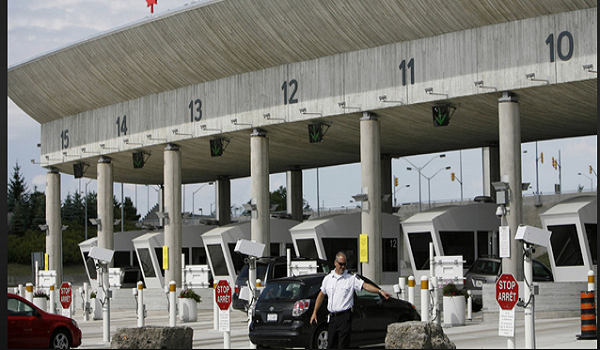Escalating trade dispute: EU pledges countermeasures against Trump’s tariffs on metals
Supply Lines is a daily newsletter that tracks global trade. Sign up here.
The European Union vowed to respond to 25% tariffs President Donald Trump said the US will impose on steel and aluminum imports, escalating a potential trade dispute with one of Washington’s closest allies.
“I deeply regret the US decision to impose tariffs on European steel and aluminum exports,” European Commission President Ursula von der Leyen said in a Tuesday statement. “Unjustified tariffs on the EU will not go unanswered — they will trigger firm and proportionate countermeasures.”
The tariffs follow through on Trump’s complaint that the EU treats the US “very unfairly,” and he often cites the bloc’s trade surplus with the US as a reason for punitive measures. The new rates will take effect on March 12, according to a pair of proclamations issued by the White House late Monday.
The EU has prepared multiple lists of American goods to hit with retaliatory tariffs if Trump moves forward with levies, modeling various possibilities depending on what the initial US salvo looks like, Bloomberg reported earlier. The bloc could move quickly by re-applying duties it first imposed on the US during Trump’s first term.
EU trade ministers will hold a video call on Wednesday to discuss their next steps.
In a speech Tuesday, German Chancellor Olaf Scholz said if the US “leaves us no other choice, then the European Union will react to this as one. As the largest market in the world with 450 million citizens, we have the strength to do so.”
Trump cast the effort as one that would help bolster domestic production and bring more jobs to the US, and warned that the rate on metal tariffs “may go higher.”
What Bloomberg Economics Says…
“Partners are likely to retaliate to the steel and aluminum tariffs if they can’t be negotiated away before the March 12 deadline.”
“It’s going to mean a lot of businesses are going to be opening in the United States,” Trump said Monday as he signed the measures in the Oval Office.
The US president also reiterated his threat to levy reciprocal tariffs against countries that have levies on US imports, saying those could be announced over the next two days. And he said the administration will be looking at levies on cars and semiconductors, as well as other potential sectors.
For the EU, the fight over American metals tariffs started in 2018 during Trump’s first term, when the US hit nearly $7 billion of European steel and aluminum exports with duties, citing national security concerns. At the time, officials in Brussels scoffed at the notion that the EU posed such a threat.
The 27-nation bloc retaliated by targeting politically sensitive companies with retaliatory duties, including Harley-Davidson Inc. motorcycles and Levi Strauss & Co. jeans. The measures were applied product-by-product and included agricultural goods and apparel in addition to steel and aluminum products.
The two sides agreed to a temporary truce in 2021, when the US partly removed its measures and introduced a set of tariff-rate quotas above which duties on the metals are applied, while the EU froze all of its restrictive measures.
A European government official said that unfreezing those tariffs, which are on pause until the end of March, could be done quickly.
“This is a blatant case of protectionism and economic self harm,” Ignacio Garcia Bercero, non-resident fellow at Bruegel think tank and former senior EU negotiator with the US, said in an interview. “The EU should do smart and fast retaliation so that the US understands actions have consequences.”
As a first step, the suspension of previously adopted retaliation measures should be lifted, he said. Then the EU should start a consultation on an additional retaliation list that takes into account the larger impact of the new measures.
“The EU will act to safeguard its economic interests,” von der Leyen said in the statement. “We will protect our workers, businesses and consumers.”
The EU exported 3.8 million metric tons of steel to the US in 2022 and 289,000 metric tons of aluminum.
Trump’s move comes before a visit from Indian Prime Minister Narendra Modi this week. India is a supplier of steel to the US and the Indian Steel Association, a lobbying group, has urged the government to take diplomatic action to secure exemptions from US trade restrictions.
The US is heavily reliant on aluminum imports to meet domestic demand, with many of those supplies coming from Canada, the United Arab Emirates and China. Net imports of aluminum reached more than 80% in 2023, according to Morgan Stanley.
“Steel and aluminum tariffs on Canada, the United States’ closest ally, would be totally unjustified,” François-Philippe Champagne, Canada’s minister of Innovation, Science and Industry, said in a statement Monday night. “Canadian steel and aluminum support key industries in the US from defense, shipbuilding, energy to automotive.”
Trump made reviving US steelmaking a signature aim of his agenda; it also was a potent political promise in Rust Belt states such as Ohio and Pennsylvania that have seen an erosion of industrial manufacturing jobs. While the United Steelworkers union, which is influential in such states, endorsed his general-election rival — former Vice President Kamala Harris — many local chapters backed Trump.
–With assistance from Kevin Whitelaw and Alberto Nardelli.
This article was first reported by BNN Bloomberg













